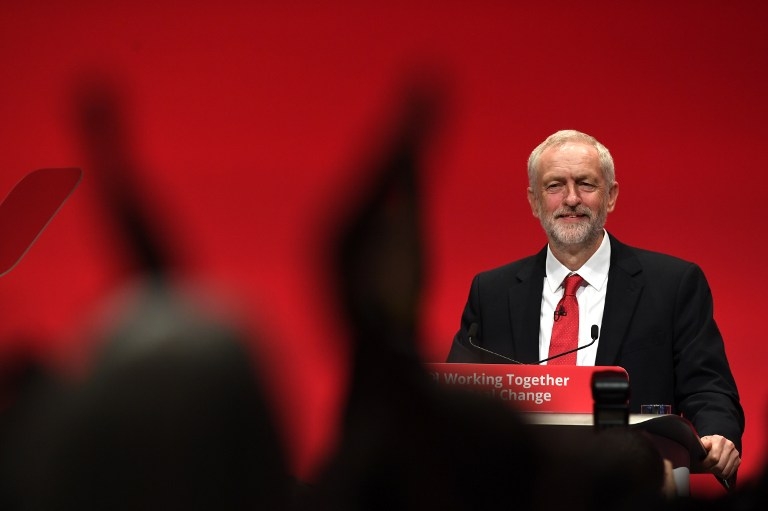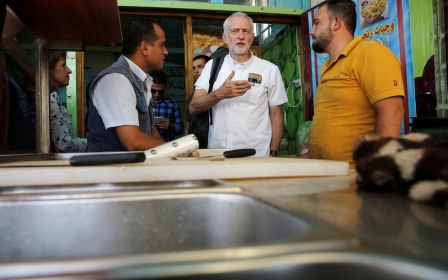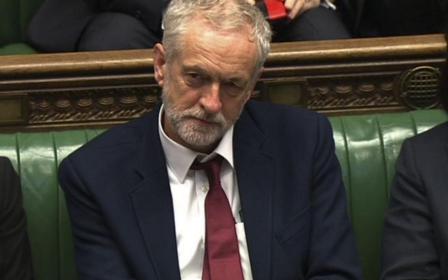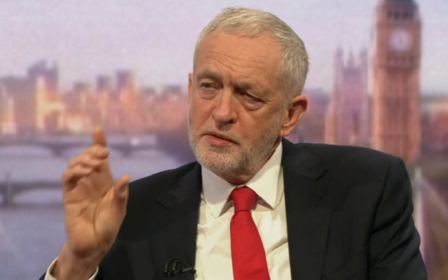UK Jewish newspapers warn of Corbyn-led government

Three British Jewish newspapers said on Wednesday that there would be an "existential threat to Jewish life in this country" if the opposition Labour Party, led by Jeremy Corbyn, won power from the ruling Conservative Party.
The Jewish Chronicle, Jewish News and Jewish Telegraph said in a joint editorial titled "United We Stand" that the Labour Party has shown a tolerance of anti-Semitism since Corbyn was elected leader in 2015.
"The party that was, until recently, the natural home for our community has seen its values and integrity eroded by Corbynite contempt for Jews and Israel," the editorial said.
A Labour spokesman said the party recognised the concerns raised by the Jewish community and acknowledged there was a "huge amount of work to do" to build trust and confidence.
"The next Labour government poses no threat of any kind whatsoever to Jewish people," the spokesman said.
"The security and wellbeing of Jewish people is a priority for our party and in government we will always ensure schools, synagogues and institutions are properly protected."
Jewish groups have previously criticised Corbyn for alleged anti-Semitism.
"Rightly or wrongly, Jeremy Corbyn is now the figurehead for an anti-Semitic political culture based upon obsessive hatred of Israel, conspiracy theories and fake news, and that is doing great harm, not just to the Labour Party, but to Britain in a wider sense," Jonathan Goldstein, chair of the Jewish Leadership Council, said back in March.
Still, many of Corbyn's supporters believe that claims of anti-Semitism are "ridiculous and absurd", given the leader's anti-racism record. They argue that the accusations are politically motivated attacks on Corbyn.
Some Corbyn supporters told Middle East Eye in March that they disagreed with their party leader over his acknowledgement of anti-Semitism within the party. They said at the time that Corbyn was being attacked by right-wing Labour members and Jewish groups who opposed his support for Palestinian rights.
Labour is currently benefiting from turmoil in Prime Minister Theresa May's Conservatives over Brexit, and has taken the lead in some opinion polls.
While an election need not be held for another four years, the wrangling over Britain's divorce from the European Union has raised the possibility of an earlier vote as May struggles to keep her government together.
Still, Labour has been wrestling with accusations that it has been tolerant of anti-Semitism among some of its members, and in April leaders of Britain's 270,000 Jews organised a protest accusing Corbyn of failing to address their concerns.
"With the government in Brexit disarray, there is a clear and present danger that a man with a default blindness to the Jewish community’s fears, a man who has a problem seeing that hateful rhetoric aimed at Israel can easily step into anti-Semitism, could be our next prime minister," the newspapers wrote on Wednesday.
Corbyn has previously apologised for what he called "pockets" of anti-Semitism in the party and promised to stamp them out. He has responded to protests by meeting with Jewish community leaders, reassuring Jewish activists that they are welcome in the party.
The latest flashpoint was the party's decision to approve a new code of conduct, which Jewish groups said watered down the internationally accepted definition of anti-Semitism. Labour said it had concerns about part of the definition, but had re-opened discussions to take into account Jewish community concerns.
New MEE newsletter: Jerusalem Dispatch
Sign up to get the latest insights and analysis on Israel-Palestine, alongside Turkey Unpacked and other MEE newsletters
Middle East Eye delivers independent and unrivalled coverage and analysis of the Middle East, North Africa and beyond. To learn more about republishing this content and the associated fees, please fill out this form. More about MEE can be found here.




